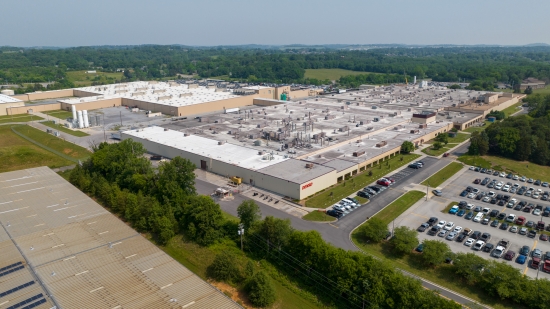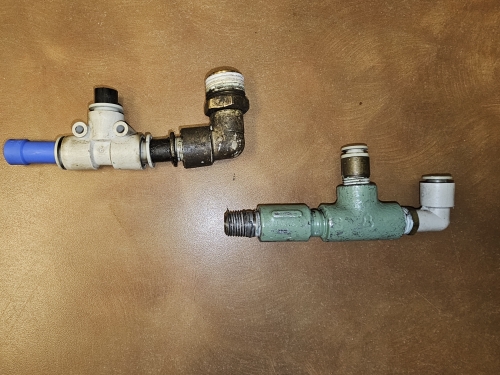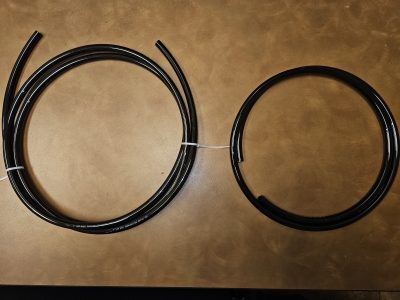
A compressed air leak management program has generated excellent results on the campus of DENSO’s Maryville, Tennessee, manufacturing facility.
Given that compressed air leak management programs are meant to save energy, reduce CO2 emissions, and generate ROI, DENSO’s Maryville, Tennessee, manufacturing facility can definitively say it has scored a trifecta when it comes to results – and reaped benefits beyond hard numbers alone.
Thanks to a robust leak management program combined with other energy-saving initiatives implemented at its massive plant, the company has reduced annual energy consumption by three percent annually and cut carbon emissions by over 15% since 2019.
In addition to helping with reductions in energy and CO2 emissions, the leak management program has generated enhanced production, since maintenance teams can now prioritize upkeep and repairs on equipment rather than fixing compressed air leaks. Production employees can also communicate more effectively on the job since ambient noise caused by air leaks is greatly diminished.
Setting Carbon Neutral Goals
The DENSO Maryville facility, which began operation in 1988, encompasses 2.7 million-square-feet under roof at its 238-acre campus. In all, the operation is comprised of five major facilities and 14 buildings. In addition to Maryville, DENSO operates production facilities in nearby Athens, Tennessee, and Statesville, North Carolina, as well as other locations throughout North America.
The Maryville operation produces a broad mix of vehicle electrification and safety products, including instrument clusters, inverters, body electronics and advanced driver assistance systems. In all, the facility employs nearly 5,000 employees.
DENSO, a leading mobility supplier and one of the largest in the world (www.denso.com/us-ca/en/), aims to be carbon neutral by 2035. To get there its teams are working cross-functionally and cross-regionally to help the company achieve its environmental goals. To date, the company has implemented multiple initiatives at its Maryville operation and around the globe.
In 2019, the team evaluated energy usage at Maryville and determined compressed air was an excellent candidate for energy savings since it makes up a significant portion of the campuses’ total energy consumption. A full-fledged leak management program became an obvious choice.
Dedicated Air Leak Technician
Initially, the Maryville team determined a production maintenance person was best suited to identify, tag and fix compressed air leaks. Eventually, however, the team decided to create role that primarily focued on leak management, said Terry R. Jones II, Facilities Energy Engineer, IV, Facilities Engineering, at DENSO in Maryville.
“We achieved good results by mid-2020, but we saw an opportunity to designate someone other than a maintenance person to the job of really looking at some of these systems,” said Jones regarding compressed air leaks. The decision, Jones said, resulted in adding John Spears as the company’s Lead Air Leak Technician. Spears had the right background for the job, not to mention the passion.
“I have a pipefitting and HVAC background,” said Spears, noting the job of an air leak technician is an entire skillset of its own and worth the investment. “It’s a trade within itself. If you have a plant this size and you don’t have a leak management program in place, you’re likely missing opportunities to conserve energy.”
Having a dedicated person for leak management in Maryville became especially important after the team realized some leaks were not fully addressed, Spears said.
“They needed a dedicated person to come in and both identify and repair these leaks,” he said. “That’s when they brought me in.”

Tags are used to identify compressed air leaks at DENSO’s Maryville facility.
In addition to putting Spears on the job of leak detection and repair, the Maryville team also implemented new leak management technology, such as sonic industrial imagers that could locate leaks in real time and estimate the energy savings of addressing them.
Approach Ensures Sustained Success
To implement the leak management program, Jones and Spears developed an approach that follows the best path for sustained success.
The approach starts when Spears meets each week with the maintenance team to determine when production lines will not be operational, allowing Spears to use the sonic industrial imager to identify and tag leaks without disrupting production.
Spears subsequently fixes leaks when compressed air is at a lower demand, taking responsibility for fixing leaks that occur in compressed air lines and drops that feed production lines. He issues work orders for the maintenance team to fix previously identified leaks within production equipment given their expertise with the machines.
According to Spears, the most common leaks are found in the connection points of the plant’s compressed air lines. The largest leaks, he said, are typically found on couplings on compressed air piping. Other leaks can be found in plastic tubing used to feed compressed air to machinery in the diecasting area.

Compressed air leaks can occur at connection points of compressed air lines.
Spears said he often fixes leaks at connection points by loosening the connection and placing pipe leak tape or sealant on the threads and tightening the connection. He will also often simply replace original coupling with stronger couplings that are more likely to hold a seal for longer periods. To fix leaks on tubes in the diecasting area, Spears cuts out the section of tubing with holes and replaces it with a connecting piece of tubing, installing a flexible heat shield when necessary.

Leaks are routinely repaired on plastic tubing that supplies compressed air to machines in the diecasting areas.
The leak management program has Spears rotating from building to building on campus. He said the work is similar, but unique at each, and that it becomes increasingly complex as the facility incorporate new manufacturing approaches, like automation and cleanroom techniques.
“In these environments, you’re looking for different types of leaks, such as loose connection points in air manifolds,” Spears said. “The issue in this situation is often that people can’t get all the way in there with a wrench to get them tight, or they don’t have the knowhow. But I’ve turned enough wrenches in my life to know how to get in there and tighten those a little better.”
Eyeing Other Operations for Energy Savings
Across the Maryville campus, the leak management program is clearly working, said Jones.
“This single program accounted for 26.5% of the total energy savings we achieved overall for 2022,” he said. “It’s pretty astounding that one program accounted for one quarter of our total campus goal for the year.”
Jones said the program, combined with other initiatives, such as better methods of compressed air control and shutting down production equipment when not needed, has contributed to the team’s ability to lower overall plant pressure and reduce the cfm required to maintain production.
Energy-saving compressed air initiatives like a leak management program have also had a positive impact on the operation’s air compressors. The system in Maryville consists of several 1,000-horsepower (hp) and 500-hp air compressors. Originally, the system was designed to have multiple running within a building to meet production demand, and as a result of the program, it now only requires one.
Jones and Spears said the team – and company leadership – could not be happier with the results, which the team is reviewing to see how it could inform approaches at DENSO’s other plants.
Spears said the maintenance teams appreciate being able to work on equipment and not air leaks. Anyone working in production also appreciates the program since it led to a quieter work environment, he said, noting one example in particular.
“After I plugged a leak, it went silent,” said Spears, much to the delight of employees on the production line.
A leak management program with dedicated technicians is something Spears said he could see happening at many other companies and plants almost everywhere.
“There’s a lot of room for growth in this field for big operations that are running compressed air. I don’t think they understand how much air they could be losing. I didn’t,” he said.
All images courtesy of DENSO
To read articles on Compressed Air Leak System Assessments, visit www.airbestpractices.com/system-assessments/leaks.
For expert presentations, visit our Webinar Archive Section dedicated to Compressed Air Measurement at www.airbestpractices.com/webinars.
Jan/Feb 2024.




